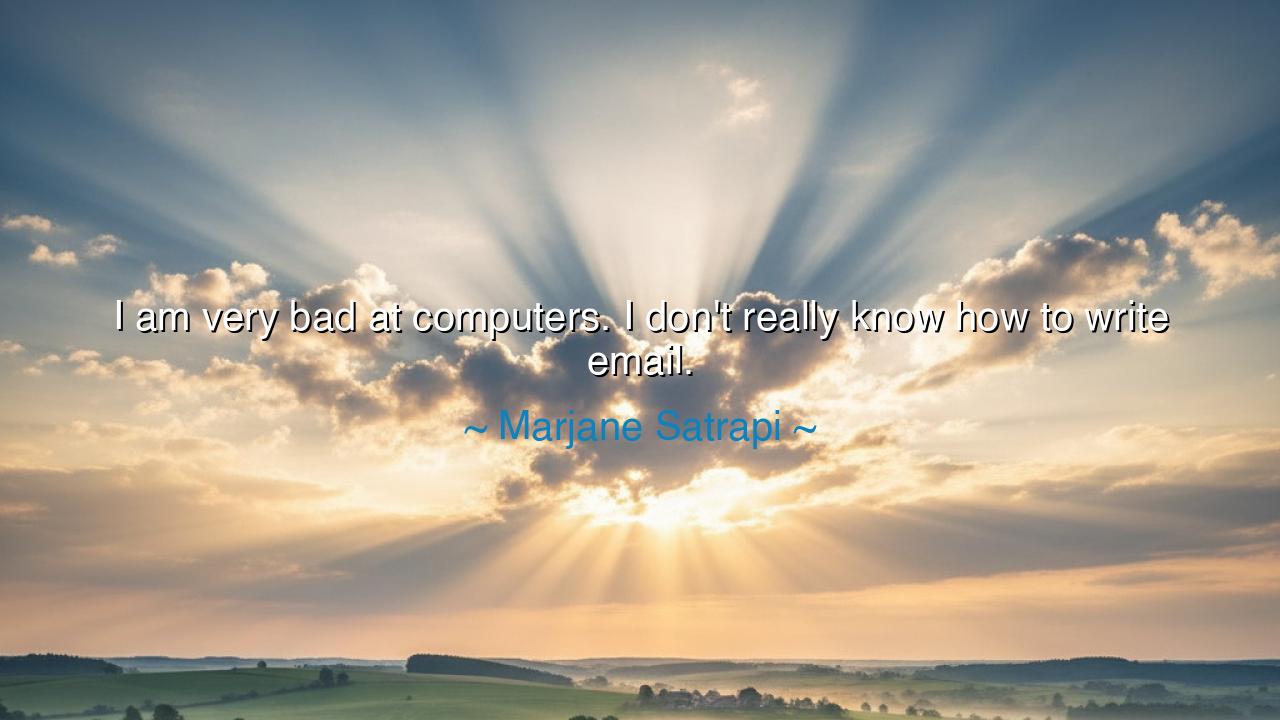
I am very bad at computers. I don't really know how to write






“I am very bad at computers. I don’t really know how to write email.” Thus spoke Marjane Satrapi, the visionary artist and author of Persepolis, whose words echo not ignorance, but wisdom wrapped in humility. To those who live by the screen, her confession may seem quaint — even outdated — yet beneath it lies a profound reflection on human connection, authenticity, and the limits of technology. In admitting her weakness, she reveals a deeper strength: the refusal to let machines define her humanity. Her statement is not merely about computers, but about what it means to remain fully human in an age of automation.
In the ancient days, when letters were written by hand and messages crossed deserts and seas, communication was an act of devotion. To write was to pour one’s heart into ink; to receive was to hold a fragment of another’s soul. Every word bore the warmth of touch, every delay the sweetness of anticipation. But the modern age has replaced this with speed — emails, brief and bloodless, flashing like comets through invisible skies. Satrapi’s struggle, then, is not a failure to adapt, but a mourning for the intimacy we have lost. In her words, we hear the lament of one who remembers when the act of writing was sacred.
Satrapi came from a land — Iran, the crossroads of empires — where stories were spoken in the marketplaces, where art and memory lived in voice and gesture. Her craft was the drawing of lines, not the pressing of keys. She painted emotions, she carved memories, she told her nation’s story in ink and vision. To her, a computer is not a friend but a wall — something that mediates rather than unites. Her difficulty with email becomes symbolic of something greater: the artist’s yearning for real communication, for the warmth of presence over the chill of code.
Consider the story of Vincent van Gogh, who wrote hundreds of letters to his brother Theo. His words, trembling with passion and despair, became as immortal as his paintings. Imagine if those letters had been emails — short, hurried, deleted, lost in inboxes. Would the world have felt his anguish, his gratitude, his slow descent into madness and beauty? Satrapi’s confession recalls the same truth: that technology may make it easier to send messages, but harder to truly communicate. The soul moves slowly, and the machine moves fast — and between these two rhythms lies the tension of our age.
Yet Satrapi’s humility carries also a quiet rebellion. To say “I am bad at computers” in a world that worships efficiency is to stand against the tide. It is to declare that art, heart, and humanity do not need permission from machines to exist. She reminds us that it is not mastery of tools that defines us, but mastery of ourselves. The greatest creations of humankind — the pyramids, the symphonies, the cathedrals — were built without computers. The human hand and heart remain the original instruments of wonder.
Still, her words are not a rejection of progress, but a call for balance. The wise do not fear the new, but they do not surrender to it either. The lesson of Satrapi’s confession is that technology must remain a servant, not a master. Learn the tools, yes — but remember the touch of pen on paper, the sound of voice in the air, the gaze of another’s eyes. For if the soul of communication is lost, then all our devices are but empty shells, glowing in the dark.
The teaching, then, is this: know your tools, but know yourself more. If you must write an email, write it as you would a letter — with intention, with warmth, with care. Let not the coldness of convenience steal the poetry from your speech. For the heart that speaks sincerely needs no technology to be heard. And remember, as Satrapi reminds us through her gentle admission — it is better to be “bad at computers” than to be good at them and forget how to be human.
So take heed, O listener of the modern age: the machine is clever, but the heart is wise. Be like Satrapi — unashamed of imperfection, unafraid of simplicity, and unyielding in your humanity. Use technology, but do not let it use you. For one day, when the last email fades and the last screen dims, it will be the human voice, not the algorithm, that endures — the timeless music of one soul reaching out to another.






AAdministratorAdministrator
Welcome, honored guests. Please leave a comment, we will respond soon